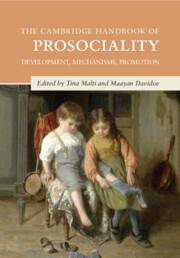Book contents
- The Cambridge Handbook of Prosociality
- Cambridge Handbooks in Psychology
- The Cambridge Handbook of Prosociality
- Copyright page
- Dedication
- Contents
- Figures
- Contributors
- Part I Development of Prosociality
- Part II Antecedents and Mechanisms of Prosociality
- 11 The Motives of Prosocial Behavior
- 12 Morality, Values, and Prosociality across Development
- 13 Emotions and Prosociality
- 14 Social-Cognitive Development and Early Prosocial Behavior
- 15 Temperament and Prosocial Behavior
- 16 Gender and Prosocial Development
- 17 Assessing Prosociality
- Part III Development of Prosociality in Context
- Part IV Applications
- Index
- References
12 - Morality, Values, and Prosociality across Development
Intertwined yet Distinct
from Part II - Antecedents and Mechanisms of Prosociality
Published online by Cambridge University Press: 25 May 2023
- The Cambridge Handbook of Prosociality
- Cambridge Handbooks in Psychology
- The Cambridge Handbook of Prosociality
- Copyright page
- Dedication
- Contents
- Figures
- Contributors
- Part I Development of Prosociality
- Part II Antecedents and Mechanisms of Prosociality
- 11 The Motives of Prosocial Behavior
- 12 Morality, Values, and Prosociality across Development
- 13 Emotions and Prosociality
- 14 Social-Cognitive Development and Early Prosocial Behavior
- 15 Temperament and Prosocial Behavior
- 16 Gender and Prosocial Development
- 17 Assessing Prosociality
- Part III Development of Prosociality in Context
- Part IV Applications
- Index
- References
Summary
This chapter discusses the intertwining of morality, values, and prosociality from childhood to adolescence. We define prosocial behaviors as acts that, if completed as intended, would directly promote the goals or welfare of others. We begin with three theoretical points: (1) People do not view all prosocial actions as inherently good or morally right. (2) Judgments about prosocial behaviors derive from reasoning about both moral and nonmoral values. (3) Judgments of right and wrong guide decisions about prosocial behaviors. From these propositions, we discuss research on three developmental periods: infancy and toddlerhood, when prosocial behaviors emerge; preschool age, when children make judgments of right and wrong; and school age to adolescence, when developments in social understanding and the coordination of competing considerations enable changes in prosocial judgments and decisions. Greater attention to how evaluative judgments shape prosocial decisions can strengthen efforts to explain and intervene on the development of prosociality.
Keywords
Information
- Type
- Chapter
- Information
- The Cambridge Handbook of ProsocialityDevelopment, Mechanisms, Promotion, pp. 233 - 255Publisher: Cambridge University PressPrint publication year: 2023
References
Accessibility standard: Unknown
Why this information is here
This section outlines the accessibility features of this content - including support for screen readers, full keyboard navigation and high-contrast display options. This may not be relevant for you.Accessibility Information
- 1
- Cited by
